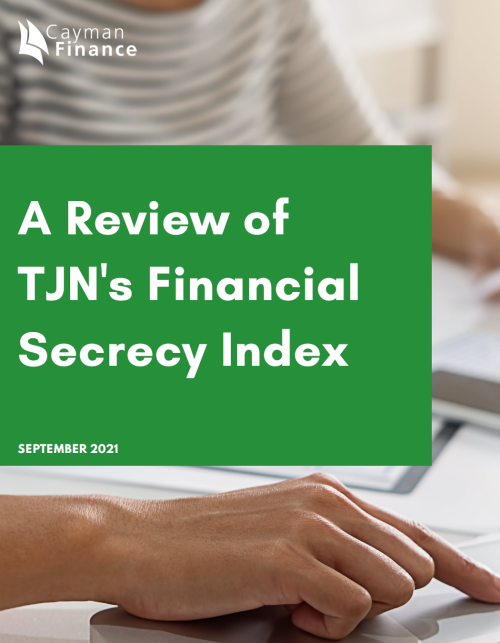
PRESS RELEASE
Flawed: Cayman Finance Challenges Credibility Of Tax Justice Network’s Biannual Financial Secrecy Index
Use of incorrect data, biased criteria make reports unreliable sources of information about Cayman Islands unless TJN makes significant changes
GEORGE TOWN, Cayman Islands – Cayman Finance has today released a new study that critically assesses the methodology and data used to assess the Cayman Islands in Tax Justice Network’s (TJN) ‘Financial Secrecy Index’ (FSI). Significant flaws in TJN’s choice of data and scoring have rendered the 2020 report an unreliable source for accurate information about the Cayman Islands financial services industry. Future TJN reports’ will also lack credibility without critical changes in the application of their own methodology – and Cayman Finance will continue to scrutinise and analyse future editions to ensure continued accountability.
“The Cayman Islands has demonstrated its commitment to the common fight for effective global transparency and international cooperation standards. However, a report on transparency needs to be transparent itself and Tax Justice Network’s 2020 Financial Secrecy Index’s failure to meet that standard compromises the credibility of its conclusions,” said Jude Scott, the CEO of Cayman Finance. “TJN used estimates and unqualified assumptions when accurate data was publicly available. Without substantial changes to TJN’s application of their own methodology in future reports, the credibility of those assessments as independent resources used by other organisations will be lost.”
Cayman Finance’s analysis found that TJN’s 2020 Financial Secrecy Index had:
Used inaccurate methodology – the FSI report failed to follow its own methodology when calculating a Global Scale Weight (GSW) – the primary factor for determining a jurisdiction’s score — for Cayman. TJN chose to use portfolio liabilities instead of publicly-available data for financial services exports. As a result, TJN’s estimate of GSW for Cayman was nearly 9 times what it should have been. If TJN had accurately applied their own methodology on just this point, Cayman would already drop down to 6th on the FSI.
Used biased criteria – the FSI report used biased Key Financial Secrecy Indicators, thereby skewing Cayman’s score further. For example, the FSI gives Cayman a 100% secrecy score for lack of public access to civil tax proceedings even though Cayman has no such proceedings because it does not have corporate or personal income tax. If these biased indicators were removed or more accurately scored along with a correct GSW calculation, Cayman would drop down even further on the FSI list to 34th position.
Julian Morris, leading economist and author of the Cayman Finance report, explains further: “While the FSI is clearly an ambitious attempt to identify jurisdictions that contribute to illicit financial flows, inappropriate and statistically questionable use of its metrics undermine the integrity of their findings. Unless TJN makes significant changes in future reports—in particular, to use accurate data, to adjust or remove biased indicators, and to aggregate data using proper statistical methods –the FSI should not be taken seriously as an assessment of jurisdictions’ contributions to illicit financial flows.”
Scott concludes: “We are confident in the leadership the Cayman Islands Government and our financial services industry have shown in adopting global standards for transparency and tax information sharing. While fraud is a global issue that we all have a continued role in tackling, both the EU and the OECD have recently reviewed the Cayman Islands tax neutral regime and found it to be transparent, consistent with good tax governance principles and without the existence of harmful tax regimes. Those are the kinds of internationally-recognised assessments that should be considered when assessing the Cayman Islands.”
A ‘Review of TJN’s Financial Secrecy Index’ by Julian Morris, as well as analyses of other TJN reports, can be found at www.caymanfinance.ky.
Cayman Finance Contact
+1 (345) 769-6200
-ends-
About Cayman Finance:
Cayman Finance is the association of the financial services industry of the Cayman Islands, a premier global tax neutral financial hub efficiently connecting law abiding users and providers of investment capital and financing around the world. Cayman Finance represents first rate service providers within investment funds and asset management, banking, insurance, reinsurance, capital markets, and trusts sectors and world class fiduciary, legal, and public accounting service providers. Additionally, Cayman Finance represents 15 industry associations. Learn more at: www.caymanfinance.ky
About Jude Scott:
Jude Scott is a respected and recognised expert on global financial services and has served as CEO of Cayman Finance since 2014. He retired as an Audit Partner in 2008 after spending over 23 years with Ernst & Young and previously served as the Global CEO of Maples and Calder. Jude attained extensive experience within the Cayman Islands’ financial services industry, having served on various government and private sector committees, including: the Cayman Islands Financial Services Council; the Cayman Islands Society of Professional Accountants; the Education Council; the Insolvency Rules Committee; and the Stock Exchange.
About Julian Morris:
Julian Morris is an economist with over 25 years’ experience in think tanks and academia. A Senior Fellow at Reason Foundation, Senior Scholar at the International Center for Law and Economics, and Fellow of the Royal Society of Arts, he is the author of dozens of scholarly articles and the editor of several books. Julian’s work focuses on the role of political and legal institutions as they relate to entrepreneurship, innovation, and sustainable development. A graduate of Edinburgh University, Julian has Masters degrees from University College London and Cambridge University, and a law degree from the University of Westminster.


